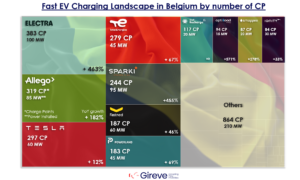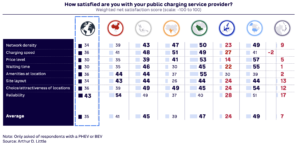For this episode of EV Frontrunners, we interviewed Mathijs van der Goot. He is the Global EV & Charging Manager at LeasePlan.
When and how did you started your career in the electric mobility space?
I’m originally coming from the side of large fleet management as a fleet consultant for our large global customers. That role included all fleet related topics, such as cost optimalisations, driver safety and sustainability. Sustainability was always an important topic, with in that time mainly a focus on lowering the CO2 footprint by selecting more fuel efficient vehicles. Back in 2015 the interest and inquiries of our global clients really turned towards full electric and I guess that’s when it gradually started for me. There was not so much volumes to manage at that time, however there where so many questions and opportunities in this fast growing field of electrification. As a large leasing company, we manage over 1.9mln vehicles, it’s extremely relevant to fully grasp this development and provide the right EV-services to our clients.
You are currently responsible for LeasePlan’s Global EV Charging business and operations. What are the biggest changes and challenges compared to 5 years ago?
Back in 2017, Leaseplan was one of the founders of the EV100 initiative designed to accelerate electric vehicle (EV) deployment and the charging infrastructure required. What progress has been made so far by this initiative?
We decided indeed as the first leasing company that we needed to act fast and big on the topic of sustainability. Electrification is already for some years now one of our key strategic pillars and is constantly emphasised in our internal and external communications. By joining the EV100 we committed publicly on the importance of sustainability and it’s been a great network to share & learn from fellow minded companies. The progress has been great. In Q4 2020, our customers ordered 16.5% of all their vehicles as an EV. This was 10.0% in Q4 from 2019. We’re now providing integrated end-to-end charging services in many of our markets and we have launched green energy contracts and smart charging services under the LeasePlan Energy brand.
What is your opinion about the current quality and interoperability of charging networks across Europe?
Interoperability is definitely still an issue. In my view it’s ridiculous that we need to provide multiple charge cards to our drivers to be able to charge your vehicle. I strongly believe the entire industry benefits from open standards and networks, simply because the pie will be bigger if we stop with (semi)-closed networks because that’s what drivers want.
The quality and especially the quantity of the public network is also a topic of concern. It’s now one of the most mentioned roadblock of our (international) customers to electrify. The topics of vehicle availability, range and TCO have all improved significantly recent years, while the charging infrastructure relatively remained behind. Off course, I do understand the complexity and I do see the huge year-on-year improvements in infrastructure, but in the end the e-vehicles improvements move with a faster pace compared to the infrastructure.
Every year Leaseplan presents the European EV Readiness Index*. This is a comprehensive analysis of the preparedness of 22 European countries for the electric vehicle transition. What are the most notable results compared to the 2020 edition?
The EV readiness index is a great analysis of the preparedness of 22 European countries for the electric vehicle transition. We’re using this internally as a business strategy tool and our client leverage this data to define their EV rollout plans.
The index ranks the countries based on the factors of EV registrations, EV infrastructure and Total Cost of Ownership. Especially the TCO part showed clear improvements:
- On average, EV drivers are taxed 63% of what Internal Combustion Engine (ICE) drivers are paying in taxation.
- Electricity cost on average 53% per kilometre compared to the fuel costs per kilometre across Europe.
- 11 countries show a lower monthly cost (inc. fuel) for a selection of EVs compared to a similar selection of ICE, showcasing the TCO parity has already been achieved in many European countries
What was your most memorable moment in your EV career so far?
Well, there has been quite few already. If I have to make a choice it’s the moment I realised how large the EV community actually was. Back in 2019 I had the honours to be part of the popular YouTube show of Fully Charged. It was during a trip with the newly launched tesla model 3 towards Norway and it included a trip on the largest electric vessel between Denmark and Sweden. My role in the show was actually very small, however the moment I saw the viewers going up to 300,000 within days I was really impressed with how many of us are interested in this field and how together we can make a difference.
Download LeasePlan’s EV Readiness Index
If interested, you can download LeasePlan’s EV Readiness Index ‘free of charge’ via www.evmarketsreports.com.



